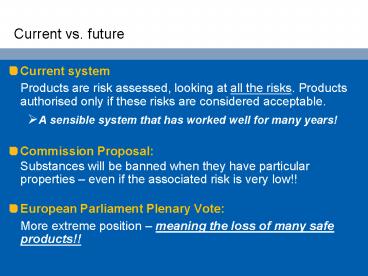Current vs. future - PowerPoint PPT Presentation
1 / 9
Title:
Current vs. future
Description:
New Compounds. Existing Compounds. Source: European Commission. What impact... More detailed information. Results of survey each criteria. Endocrine disruptors ... – PowerPoint PPT presentation
Number of Views:166
Avg rating:3.0/5.0
Title: Current vs. future
1
Current vs. future
- Current system
- Products are risk assessed, looking at all the
risks. Products authorised only if these risks
are considered acceptable. - A sensible system that has worked well for many
years! - Commission Proposal
- Substances will be banned when they have
particular properties even if the associated
risk is very low!! - European Parliament Plenary Vote
- More extreme position meaning the loss of many
safe products!!
2
What impact...?
- Many active substances already lost since the
early 90s - And the impact of losing two thirds of what is
left???
3
What impact...?
- Insecticides substances that would be lost if
- Parliament proposal
- would be a ban on
- All pyrethroids,
- All organophosphates
- All carbamates
- Most neonicitinoides
COMMISSION COMMISSION COMMISSION
ASs
8 Minimum
20 Maximum
PARLIAMENT PARLIAMENT PARLIAMENT
ASs
83 Minimum
94 Maximum
4
What impact...?
- Fungicides substances that would be lost if
- Parliament proposal
- would be a ban on
- All triazoles
- All dithiocarbamates
- A number of Strobulorins
COMMISSION COMMISSION COMMISSION
ASs
12 Minimum
34 Maximum
PARLIAMENT PARLIAMENT PARLIAMENT
ASs
69 Minimum
85 Maximum
5
What impact...?
- Herbicides substances that would be lost if
- Parliament proposal
- would be a ban on
- All dinitroanalines
- All pyridines
- And FOPs would be at risk
COMMISSION COMMISSION COMMISSION
ASs
10 Minimum
23 Maximum
PARLIAMENT PARLIAMENT PARLIAMENT
ASs
55 Minimum
81 Maximum
6
Cut offs proposed More detail!
- Commission Proposal
- Substances will be banned when they have
particular properties - Endocrine disruptors
- CMR-1/2 - Substances that may have carcinogenic
(C), mutagenic (M) or reprotoxic (R)
characteristics - Note Alcohol is an endocrine disruptor, as well
as being a C, an M and an R - POPs (Persistent Organic Pollutants) trigger
criteria set out for Persistency,
Bio-accumulation and potential for long-range
transport - PBT trigger criteria for Persistency,
Bio-accumulation and Toxicity - vPvB - trigger criteria for very Persistent and
very Bio-accumulative - European Parliament Plenary Vote
- More extreme position meaning the loss of many
safe products!! - Trigger only 1 of the 4 POPs criteria
(Persistent Organic Pollutants) see above - This criteria alone would mean the loss of over
half of our substances - Developmental Neurotoxic
- immunotoxicity,
- bee toxicity...
- The Parliament criteria would have the biggest
impact on insecticides!
7
More detailed information Results of survey
each criteria
- 210 substances evaluated
- 3 (poss.7) trigger CMR 12 (R up to 6)
- 15 (poss.20) trigger neurotoxicity
(developmental?) - lt1 trigger immunotoxicity
- 55 (poss.70) trigger 1 out of 4 POP criteria
(T approx 50) - lt1 trigger all 4 criteria (Comm proposal)
- lt1 trigger PBT vPvB
- 3 (poss.20) trigger endocrine disruption (human
env.) - 15 (poss.20) trigger toxicity to bees criteria
(HQgt50)
8
Endocrine disruptors(DHI report for EU
Commission, May 2007)
Category 1 Category 1 Category 2 Category 2
A.s. name Annex I A.s. name Annex I
Metiram Yes Cypermethrin Yes
Procymidone Yes Bromoxynil Yes
Mancozeb Yes Iprodione Yes
Fenarimol Yes Dimethoate Yes
Deltamethrin Yes Carbendazim Yes
Metribuzin Yes Ziram Yes
Lambda cyhalothrin Yes Fluvalinate (tau-fluvalinate?) Pending
Ioxynil Yes Fenoxycarb Pending
Linuron Yes Etridiazole Pending
Thiram Yes Triadimenol Pending
Amitrole (aminotriazole) Yes Pyrethrin (organagri) Pending
Maneb Yes Dicofol Pending
Picloram Pending Prochloraz Pending
Bifenthrin Pending Methylbromide Pending
Metam sodium Pending Propanil Pending
Acetochlor Pending Piperonyl butoxide (synergist) Not an a.s.
9
Endocrine disruptors
A.s. name Annex I
Metiram Yes
Procymidone Yes
Mancozeb Yes
Fenarimol Yes
Deltamethrin Yes
Metribuzin Yes
Lambda cyhalothrin Yes
Ioxynil Yes
Linuron Yes
Thiram Yes
Amitrole (aminotriazole) Yes
Maneb Yes
Picloram Pending
Bifenthrin Pending
Metam sodium Pending
Acetochlor Pending































